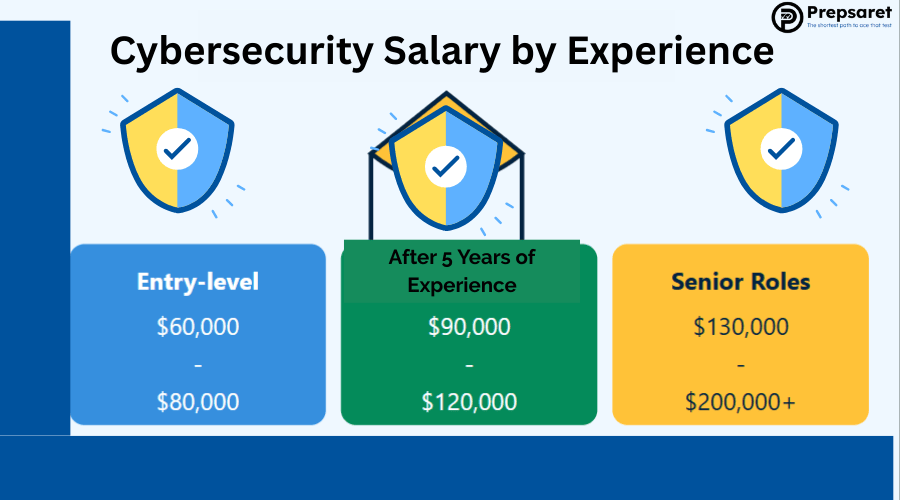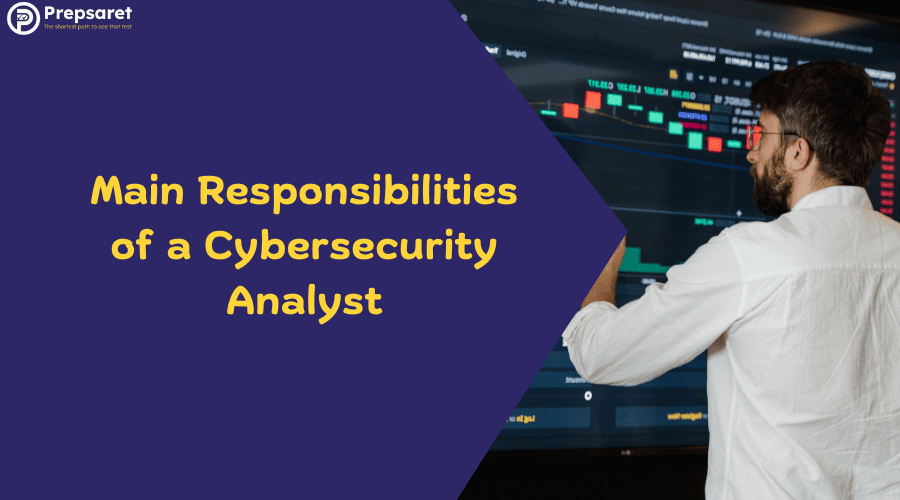In today’s digital world, where cyber threats are on the rise, cybersecurity analysts have become essential in safeguarding organizations’ data and networks. With the increasing frequency and complexity of cyberattacks, businesses are looking for skilled cybersecurity analyst more than ever.
If you’re thinking about joining the cybersecurity field, this role could be your ticket to an exciting and rewarding career. If you want to effectively prepare for your CompTIA Security+ exam, you can find high-quality study materials, including practice exams, on Prepsaret to help you succeed in the field.
What is a Cybersecurity Analyst?
A cybersecurity analyst is the person tasked with defending an organization’s computer systems and networks against security breaches and cyber threats. They are responsible for monitoring, identifying, and responding to potential cyberattacks to ensure data confidentiality, integrity, and availability.
Their role is essential in maintaining the security of both digital and physical assets.
Their main duties include:
- Monitor Networks: Cybersecurity analysts vigilantly monitor systems and networks for suspicious activity.
- Threat Detection: Identifying security vulnerabilities, malware, and potential threats to the organization’s infrastructure.
- Incident Response: Acting quickly to respond to security breaches, minimizing damage, and restoring normal operations.
In short, a cybersecurity analyst plays a vital role in safeguarding sensitive data and preventing cybercrimes that could disrupt the organization’s operations.
Cybersecurity Analyst Requirements
To succeed as a cybersecurity analyst, you’ll need a combination of technical skills, analytical abilities, and personal qualities. The Cybersecurity analyst requirements are not hard and fast but here are some considerations:
- Technical Skills: Knowledge of network security, operating systems, and security tools.
- Analytical Skills: Ability to analyze data, identify patterns, and assess risks.
- Communication Skills: Ability to communicate technical information to non-technical audiences.
Cybersecurity Analyst Job Description
The day-to-day duties of a cybersecurity analyst vary, but they all revolve around the core objective of ensuring data protection and security. Their responsibilities include monitoring networks, investigating security incidents, and applying fixes to vulnerabilities.
Here’s a deeper look into the tasks of a cybersecurity analyst:
Key Responsibilities:

- Network Monitoring and Defense: Using tools like firewalls, antivirus software, and SIEM (Security Information and Event Management) systems to monitor for intrusions and threats.
- Security Tools: Managing and using intrusion detection systems (IDS) and vulnerability scanners to find weaknesses in the system.
- Collaboration: Working closely with other IT professionals to implement security measures and ensure compliance with security protocols.
- Documentation: Creating reports detailing vulnerabilities, threats, and responses.
Tools commonly used by analysts include:
- SIEM (Security Information and Event Management): Collects and analyzes security logs from various sources.
- IDS/IPS (Intrusion Detection/Prevention Systems): Detects and prevents malicious activity on the network.
- Firewalls: Blocks unauthorized access to the network.
- Antivirus Software: Detects and removes malware from systems.
A cybersecurity analyst must also stay current with the latest security trends and emerging technologies to keep their company secure.
Related post: Cybersecurity Jobs
Cybersecurity Analyst Salary and Career Outlook
The cybersecurity analyst salary can vary significantly based on experience, certifications, and geographic location. Entry-level cybersecurity analysts can expect to earn a starting salary ranging from $50,000 to $70,000 annually.
Even the cybersecurity analyst salary entry level is very promising. However, as you gain experience and earn specialized certifications, you can see salaries rise dramatically.
Here’s a breakdown of potential salaries:

- Entry-Level Cybersecurity Analyst Salary: $50,000 – $70,000
- Mid-Level Cybersecurity Analyst Salary: $70,000 – $100,000
- Senior Cybersecurity Analyst Salary: $100,000 – $150,000+
Salaries can also be higher if you’re working remotely or in high-demand areas, such as cybersecurity analyst jobs remote positions.
Read more: cybersecurity salary
Cybersecurity Analyst Jobs and Career Growth
The demand for cybersecurity analysts is skyrocketing, and there’s no sign of this slowing down. Cybercrime continues to evolve, and businesses need experts to protect their data. Career advancement opportunities include:
- Junior cybersecurity analyst → Cybersecurity analyst → Senior cybersecurity analyst
- Specialized roles such as penetration tester or cloud security expert
- Leadership positions like Chief Information Security Officer (CISO)
As organizations expand their digital infrastructure, more roles are opening up across various industries. Additionally, sectors like finance, government, and healthcare often offer attractive salaries and job stability for cybersecurity professionals. The Cybersecurity analyst Reddit online forum serves as an indicator of the rising demand.
How to Become a Cybersecurity Analyst
Becoming a cybersecurity analyst often begins with a strong foundation in IT or computer science. A bachelor’s degree is recommended, though it’s not always necessary. Many individuals in this field start with certifications, gaining practical skills before pursuing a degree.
Certifications for Cybersecurity Analysts:
- CompTIA Security+: A foundational certification for those just entering the field.
- CISSP (Certified Information Systems Security Professional): A highly regarded certification for senior roles.
- CEH (Certified Ethical Hacker): A must-have for those interested in ethical hacking.
- Microsoft Cybersecurity Analyst Professional Certificate
- IBM Cybersecurity Analyst Professional Certificate
Skills and Experience
To be successful as a cybersecurity analyst, you’ll need:
- Network Security Knowledge: Understanding firewalls, VPNs, and IDS/IPS.
- Threat Detection: Identifying and mitigating cyber threats using security tools.
Incident Response: Knowing how to respond swiftly and efficiently to security breaches.
In addition to certifications, you’ll need a solid understanding of network security, threat detection, and incident response. Start with cybersecurity analyst entry level jobs to gain experience.
- Technical Skills: Familiarity with security tools, operating systems, and network protocols.
- Analytical Skills: Ability to analyze data, identify patterns, and assess risks.
- Communication Skills: Ability to communicate technical information to non-technical audiences.
Even if you’re new to the field, entry level cybersecurity analyst roles are available, where you can start building your skills and gain hands-on experience.
Cybersecurity Analyst Certification
While a degree may open doors, cybersecurity analyst certification is often what sets candidates apart in this competitive field. Specialized certifications can boost your salary potential and make you more attractive to employers. Some cyber security certifications are very helpful.
Top Certifications for Cybersecurity Analysts:
- CompTIA Security+ certification: Ideal for those starting out, offering a broad overview of security concepts.
- CISSP: A high-level certification for experienced professionals.
- CEH (Certified Ethical Hacker): A popular certification for those focused on penetration testing.
- Microsoft Cybersecurity Analyst Professional Certificate: A comprehensive certification program that provides hands-on experience and advanced skills.
- IBM Cybersecurity Analyst Professional Certificate: A great choice for individuals looking to gain expertise in cybersecurity through IBM’s program.
- Splunk Certified Cybersecurity Defense Analyst: Demonstrates expertise in using Splunk for security operations.
These certifications enhance your knowledge and skills, making you more competitive in the job market.
Related post: CompTIA Security+ vs CISSP
Cybersecurity Analyst Career Paths
Starting as an entry-level cybersecurity analyst or junior cybersecurity analyst can be the first step toward an exciting career in cybersecurity. At this stage, your primary responsibilities will likely include monitoring systems, handling security incidents, and learning the ins and outs of threat detection.
Entry-Level Cybersecurity Analyst
Starting as an entry-level cybersecurity analyst, you’ll focus on:
- Monitoring security alerts
- Assisting in incident response
- Performing vulnerability scans
Advanced Cybersecurity Analyst Roles
With experience, you can move into specialized or senior roles like:
- Cybersecurity Data Analyst: Focuses on analyzing security data.
- Security Architect: Designs security frameworks for organizations.
- Cybersecurity Manager: Leads a security team and develops policies.
These roles often come with higher salaries and more responsibility, as you move from defending systems to creating and designing secure infrastructures.
Remote Cybersecurity Analyst Jobs

The rise of remote work has opened up a wealth of opportunities for cybersecurity analyst jobs remote. Many organizations offer remote positions to attract top talent, as cybersecurity skills are in high demand globally. Some companies that commonly offer remote roles include:
- Amazon
- Cisco
- Microsoft
Advantages of remote cybersecurity analyst roles:
- Flexible work arrangements
- Global job market access
- Reduced commuting costs
- Increased work-life balance
Working remotely as a cybersecurity analyst can offer flexibility and access to a global job market. However, it also comes with challenges like staying connected to a distributed team and maintaining communication on security protocols.
Cybersecurity Analyst Resume Tips
Your resume is your first impression, so make it count! Here are some tips to help you create a cybersecurity analyst resume that stands out:
- Highlight Your Certifications: List all relevant certifications, such as CompTIA Security+, CISSP, or CEH.
- Showcase Your Skills: Emphasize your technical skills, analytical abilities, and communication skills.
- Quantify Your Accomplishments: Use numbers to demonstrate your impact, such as “Reduced security incidents by 30%.
Why Prepsaret is the Best Study Tool for CompTIA Security+
To effectively prepare for cybersecurity analyst certification exams like CompTIA Security+, Prepsaret offers a comprehensive suite of study materials. These include:
- CompTIA Security+ SY0-701 Practice Exams: Mimic the real exam experience and test your knowledge.
- Study Notes: Detailed guides and explanations to help you understand complex topics.
- Personalized Study Plans: Adjust your study schedule based on your strengths and weaknesses.
Prepsaret is specifically designed to help you succeed in exams and build the knowledge needed to excel in your cybersecurity analyst career. A Cybersecurity Analyst course will help you gain practical understanding.
FAQs
Can I Make $200,000 a Year in Cybersecurity?
Yes, senior roles in cybersecurity, such as security architects and penetration testers, can earn up to $200,000 a year with the right experience and certifications.
Do Cybersecurity Analysts Get Paid Well?
Yes! The salary for a cybersecurity analyst can range from $50,000 for entry-level positions to over $150,000 for more experienced roles.
How Hard Is It to Become a Cybersecurity Analyst?
It requires specialized knowledge and hands-on experience, but with certifications like CompTIA Security+ and a bit of dedication, even entry-level candidates can succeed. Some governments offer free government cyber security training programs to help individuals develop cybersecurity skills.
Do I Need a Degree for Cybersecurity?
A degree can help, but it’s not mandatory. Many professionals in the field gain skills through certifications and hands-on experience.
What Are the Skills Required for a Cybersecurity Analyst?
Key skills include network security knowledge, threat detection, incident response, and proficiency with security tools like SIEM, IDS, and firewalls.
Start Your Cybersecurity Analyst Journey Today!
Cybersecurity is a thriving field with plenty of opportunities, and becoming a cybersecurity analyst is a great way to enter the industry. With the right education, certification, and hands-on experience, you can grow your career and make a real impact on protecting digital assets.
Start your preparation for CompTIA Security+ and other cybersecurity certifications today with Prepsaret’s comprehensive study resources, including practice exams, study notes, and personalized plans to help you succeed.

